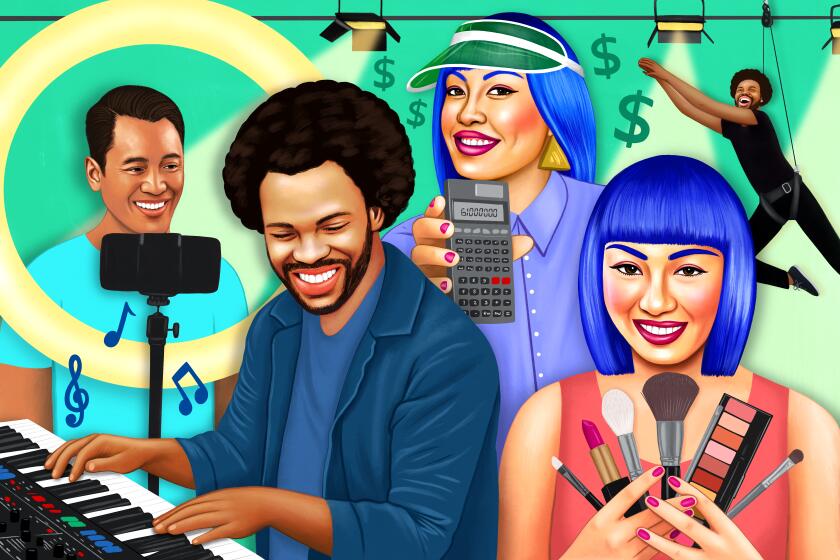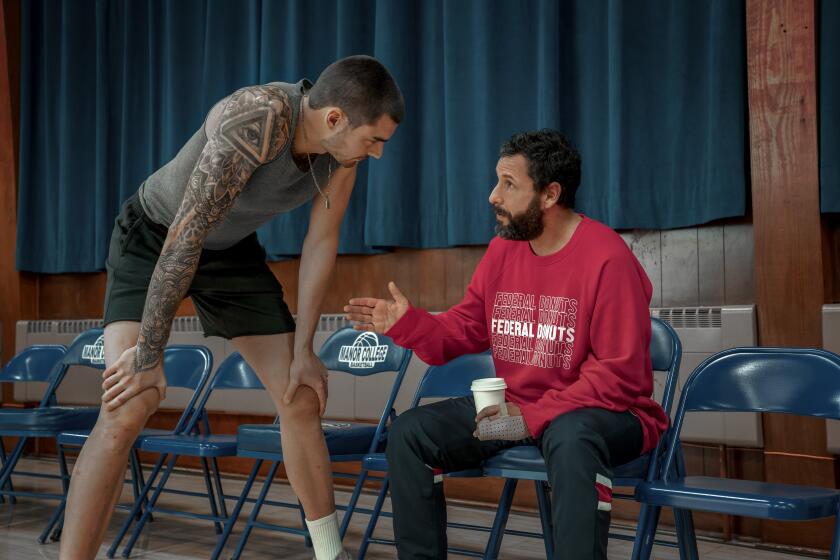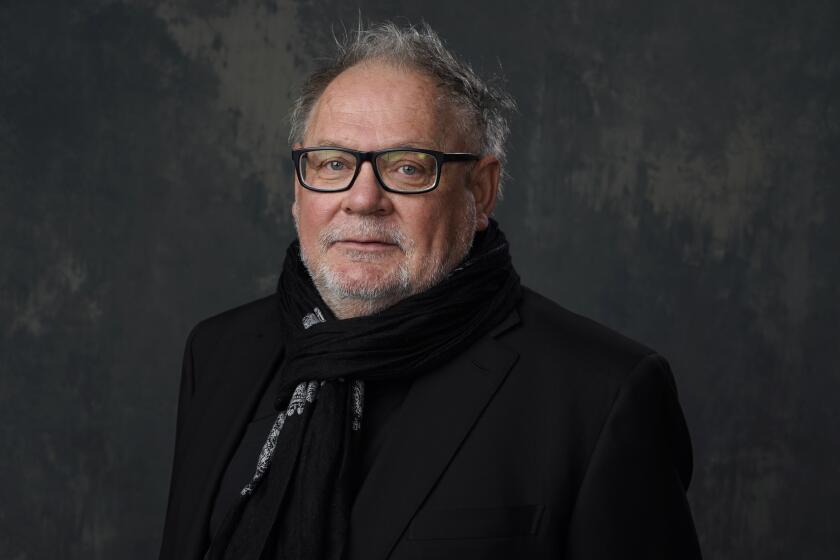Explaining Hollywood: How to get a job as a film festival programmer

- Share via
Lili Rodriguez’s first job managing a film program was for the Palm Springs International Film Festival’s After Dark program. She remembers screening Juanfer Andrés and Esteban Roel’s horror thriller “Shrew’s Nest” at 11 p.m., and during a pivotal scene, she stood in the back of the theater and watched 200 people jump back in their seats at the exact same time.
“I almost cried for joy,” she said. “I can’t even imagine how the filmmakers feel. I’ve never been interested in being a filmmaker, but as a curator, a little bit of that moment is you.”
There are more than 10,000 film festivals around the world, and more than 4,500 just in the United States, according to the online film festival and indie film marketplace FilmFreeway. Los Angeles has the most of these events by far.
There are many types of film festivals. There are the major ones such as Sundance, Toronto or Cannes that can ignite a filmmaker’s career and put a film on track for an Oscar win. There are regional film festivals that bring buzzworthy indie or international films to their towns and showcase works from local filmmakers. There are also festivals that focus on particular mediums (short films, documentaries, animation), missions (the environment, human rights) or identities (everything from women, ethnic and LGBTQ-focused festivals to ones for sci-fi fans).
Most of the programmers The Times interviewed say that they “fell into” the job. There isn’t a defined pathway. Many of them didn’t even realize it was a career at first. They started with a love of movies, then gained a love of the film festival environment — and wanted more.
“It’s like summer camp,” said Faridah Gbadamosi, senior programmer at the Tribeca Film Festival. “There’s people that I know that I will see every year at this place. ... It really creates a family vibe.”
But planning a film festival is also a lot of work. “I think that a lot of people almost idealize our jobs,” said Kim Yutani, director of programming for the Sundance Film Festival. “They think, ‘Oh, I would love to watch movies for a living.’”
But film festival work goes beyond the actual event. Programmers are screening submissions throughout the year to get the final selections; they’re building relationships with filmmakers and other industry members; they’re providing support for up-and-coming talent. Their work helps films continue to have impact beyond the time audiences are watching it.
“I love that moment when you see a film that just changes your life,” said Martine McDonald, the director of artistic development at Outfest. “Every now and then, there’ll be a film that I’m like, ‘My life is better after seeing that.’”
To learn more about being a film festival programmer, The Times spoke with Yutani, Gbadamosi, McDonald and Rodriguez, now the artistic director of the Palm Springs International Film Festival; along with Diana Cadavid, artistic director of the Los Angeles Latino International Film Festival and programmer at the Toronto International Film Festival; Sudeep Sharma, a programmer at Sundance; and Anderson Le, artistic director of the Hawaii International Film Festival. Here are some of their insights.
Who becomes a film festival programmer?
It’s not just about loving films. To be a festival programmer, you have to live and breathe them. It’s not a 9-to-5 job. Even if programmers aren’t screening films for their festival, they’re watching other films, reading about new films, going to other film events and talking to people about films.
The reality: As a film festival programmer, you’re not always watching great films. You have to have a high tolerance for all types of films — and an appetite for digging through a lot of material of wide-ranging quality.
It takes considerable stamina to be a curator. The Sundance Film Festival — which returned this week with in-person showings for the first time since the pandemic started — received almost 16,000 submissions this year. At peak times, everyone on Sundance’s 12-person team is watching films from the moment they wake up until the time they go to sleep, said Yutani.
“People always ask, ‘Do you watch the whole thing?’” said Sharma. “And the answer is yes! … How could you make an evaluation on something, if you’re not really evaluating it?”
In our second year building The Times’ guide to breaking into Hollywood, we’ve learned even more helpful advice. Here’s some of the best.
You’re not passively watching the films. Given the volume of works you’re evaluating, you’ll need to take notes during the screenings and sometimes watch films multiple times so that you know them well enough to advocate for them. And you have to do this for months at a time.
“It can be psychologically exhausting,” Rodriguez said.
But what unites programmers is their commitment to the power of storytelling and their belief in film festivals as a platform to elevate projects that wouldn’t get opportunities to find audiences otherwise, said Cadavid.
The best film festival programmers are generally well-rounded and have a sense of what’s happening in the world, from sports to politics to social media trends, said Yutani. This is because films are not watched in a vacuum. Programmers need to understand what audiences are thinking about and how their film selections could help deepen conversations in worthwhile ways.
It also helps to be social if you want to be a film festival programmer. “That’s the part I didn’t really understand at first,” said Yutani. “When I first wanted to be a programmer, it was because I can watch independent films all day long. But there’s a whole other side of things that’s public-facing.”
Programmers aren’t watching just the submissions their festival receives. They are meeting filmmakers, producers, distributors, sales agents and more to get a sense of the landscape of releases. It’s just as important to be connecting with aspiring Hollywood creatives — even those who may not make a film for years.
And you also have to be a good writer, said Gbadamosi, because programmers are the ones writing all the film descriptions for the program schedule. They need to be able to explain the film in a way that will resonate with their audience.
How do you get started?
The experts recommend finding a festival in your area and volunteering for it. Most local film festivals are nonprofits that are always in need of volunteers, they said.
The organizations that run film festivals are made up of many departments, and many programmers gained their foothold by working in other positions. Sharma was the coordinator at the Indian Film Festival of Los Angeles when he was a graduate student in film studies at UCLA. He remembers making badges, working with spreadsheets and doing more of the physical labor. Eventually he started reading scripts for the Sundance Institute, and now his focus is programming documentary feature films for Sundance.
Rodriguez said she benefited from starting at a smaller regional festival as a guest relations assistant, where she got to know everyone well and was mentored. Don’t get too caught up on being a programmer right away, she said. Just help out, talk to people, make friends and learn about the inner workings of a film festival as an event.
There are often jobs to do in marketing (press kits, sponsorships), audience development (social media posts), hospitality (accommodations for filmmakers and other guests), venue management, education (mentorship programs and training), database management, finance, human resources and more, said Gbadamosi, who also got her start working with guests.
The first in-person Sundance since 2020 is about to begin. Our critic has some early recommendations, including ‘The Eternal Memory’ and ‘Mami Wata.’
Once you meet enough people and start to gain trust, look for a chance to become part of the screening — or prescreening — committee. These are the people who aren’t yet involved in making the choices for the festival, but they give notes to help the programmers get to the final picks.
Festivals get such a high volume of submissions, many of the screening committee jobs are volunteer positions as well. Often, aspiring programmers can start with putting in just a few hours a week, said Cadavid, to get a sense of the selection process.
You don’t need a film degree to become a programmer, but it helps to have a track record of thinking about film critically. Before Gbadamosi became a programmer, she used to write film reviews for Black Girl Nerds and other sites and tweet film recaps.
McDonald started as an educator, curating films for middle school, high school and college curricula. She also worked at the New York Children’s Film Festival. “I think programming for children is very important as well,” she said. “You’re raising an audience. How do you build an audience, and how you build the future of our arts workers’ world?
It’s also common for programmers to start out in film production before realizing they were more interested in curation. Cadavid was an editor and producer on various short films and music videos. Yutani was Gregg Araki’s assistant on “Doom Generation,” which debuted in Sundance in 1995; an uncensored director’s cut is screening in this year’s program.
And some programmers gained credibility by launching small festivals where they saw gaps. Gbadamosi helped start the Korea Expat Film Festival when she was teaching English in Korea. Cadavid helped launch the International Film Festival of Panama.
What are the career paths?
There are two general routes: one for folks who ultimately want to run a film festival, the other for people who are more interested in watching films than planning events.
Rodriguez is an example of the first group. She started as an intern at the Palm Springs International Film Festival and worked her way up to artistic director, where she now oversees all departments and sets the tone of the entire event.
Programmers in the second group usually start by jumping from small festival to small festival, working their way up to the bigger ones.
Some end up being consultants for film festivals. Le is the artistic director of the Hawaii International Film Festival, but he also consults for the Los Angeles Asian Pacific Film Festival, the Far East Film Festival in Udine, Italy, the Singapore International Film Festival and Reel Asian in Toronto.
This path often involves a lot of temporary contract work. It helps to either live in a city with a lot of film festivals — L.A., New York or San Francisco, for example — or be open to travel. Gbadamosi said that over the course of her career, she’s worked at about 40 different festivals, so she’s lived in such distinct spots as Maine, Pennsylvania, Missouri, Louisiana and South Korea. If your goal is to work for one of the more prestigious, international film festivals, the work will also involve travel.
For Yutani, Sundance was always the goal. All the films she loved came out of Sundance.
But even if you don’t end up at Sundance, there are a lot of transferable skills that come with film festival work, said Le. For example, you could get experience working with sponsorships or grants. Some who work in film festivals end up going into producing. In 2020, Le and a team of Vietnamese American filmmakers launched a boutique film studio, EAST Films, to develop content for Vietnam and the Vietnamese diaspora.
Because the actors branch is the motion picture academy’s largest faction, the SAG nominations offer a reliable indication of how the Oscar acting races will go.
How do you make money? (And what kind of money?)
Film festival work “is not a huge moneymaker,” said Sharma. “There has to be something driving you that’s not financial.”
Unless you’re at one of the bigger film festivals, many programming gigs are not full-time jobs. So you may be holding down another full-time job and programming on the side. Or you’ll be cobbling together multiple contract jobs, whose perks could include a modest travel stipend and passes to all of the film festivals you’d be saving up to attend anyway — but not necessarily health insurance.
“It’s financially hard to make it,” said Gbadamosi, who worked as a digital research analyst at Verizon before she could make a living as a programmer. It can take decades to land a full-time programming job.
But the film festival programmers said they feel a great sense of purpose as they’re doing their work. “It feels like you’re really contributing to something that matters,” Sharma said.
How is this career different than it was 10 or 25 years ago?
Le’s first job at the Hawaii International Film Festival was delivering film prints to screenings. This was before films would be submitted digitally. “Back when there were 50-pound 35mm film cans, it was a huge workout,” he said.
Nowadays, having digital options to view films makes programming work more accessible to those who don’t have the means to travel to lots of film festivals.
Cadavid said there’s also been “an explosion of film festivals, which is fantastic.” That opens up more opportunities for people who want to pursue film festival programming as a career.
The industry used to be very opaque, said Gbadamosi. Now there are groups like the Programmers of Colour Collective, also known as POC2, that “advocate for a more inclusive programming pool worldwide.”
McDonald sees her work as creating welcoming spaces for those who may be more vulnerable to the challenges of an industry that can be brutal on your mental health. “That’s great that you got your film distributed, but how are you taking care of yourself?” she’ll ask creatives. “How can you not make your value as a person dependent on how successful your film is? ... Is this a story you’re ready to tell, or will it harm you in process?”
The pandemic escalated challenges that film festivals had already been grappling with: How do you get people to come out to a theater when they can watch so many things at home or on their phone? How do film festivals create an online presence?
Many festivals are branching out and creating storytelling programs outside of film. Le said the film festival has started a program featuring online critics, including those who do vlogs, video essays and podcasts. Tribeca has branched out into music and gaming, Gbadamosi said.
Outfest started a free virtual queer museum called the OutMuseum. Every few weeks, a new curator programs a selection of short films on a particular topic, such as Stories from LGBTQ+ Youth or the Filipinx experience. The current program, guest curated by Parisa Barani and Parisa Parnian, is “Jin, Jiyan, Azadi. Woman, Life, Freedom,” a collection of films from the LGBTQ Iranian diaspora.
How ‘Schindler’s List’ launched one of the all-time great director-cinematographer collaborations. ‘He loves, genuinely loves, making movies, and that’s it,’ Janusz Kamiński says of Steven Spielberg.
What advice do pros always hear that is wrong?
“I always thought, ‘Oh, I have great taste in film; therefore I should be a festival programmer,’” said Sharma. But he said he soon learned that programming wasn’t just about picking the films that you like the most.
“It’s not the ‘Sudeep Sharma Film Festival,’” Yutani said. “Though I would love to be an attendee at that film festival.”
You’re playing matchmaker, said Rodriguez. You’re looking for movies that you think this audience is going to respond to. That doesn’t mean that you don’t try to challenge your audience — “You know, sometimes I’ll program a nine-hour Chinese documentary,” said Le — but it’s more important for a programmer to be open and collaborative.
“We have a whole process of how we talk about the films,” Yutan said of the Sundance programming team. “We all come from different backgrounds, we all have different tastes in film, and I think together that helps us come together and make these very difficult decisions.”
“I think you become a better programmer the longer you do the job,” Sharma said. “It’s almost like losing your own personal taste, [in exchange for] what you can identify as a potential film for the festival.”
Another thing many people don’t realize: Programmers sometimes have to reject a good film just because it’s not the best fit for that year’s program. “The longer you do this job, the harder it gets [to do that], because you keep accumulating friendships and relationships,” Sharma said.
Part of the job as a film festival programmer is to facilitate these big moments that filmmakers have worked so hard to achieve. Often you are experiencing these emotional highs and lows with them, and as humbling and joyful as it is to see the successes, Sharma said, it can also be difficult to witness the disappointments.
What’s some good advice?
Really think about why you want to be a programmer, said McDonald. What are the ways you can champion a filmmaker? What are you curious about? What are the larger conversations you want to have?
Even when you’re planning movie nights just for your friends, understand what’s important to you.
“For myself, I always say, ‘Practice wonder, curate justice and cultivate belonging,’” she said. “And that is equal parts of listening to the community as much as it is making an offering.”
“Something that makes you very proud of your work when you’re a film programmer is to see how those relationships evolve,” Cadavid said. “And to see how the films that you bring to the table open up a conversation, both with the audience and within the industry.”
About The Times Utility Journalism Team
This article is from The Times’ Utility Journalism Team. Our mission is to be essential to the lives of Southern Californians by publishing information that solves problems, answers questions and helps with decision making. We serve audiences in and around Los Angeles — including current Times subscribers and diverse communities that haven’t historically had their needs met by our coverage.
How can we be useful to you and your community? Email utility (at) latimes.com or one of our journalists: Jon Healey, Ada Tseng, Jessica Roy and Karen Garcia.
More to Read
Inside the business of entertainment
The Wide Shot brings you news, analysis and insights on everything from streaming wars to production — and what it all means for the future.
You may occasionally receive promotional content from the Los Angeles Times.















